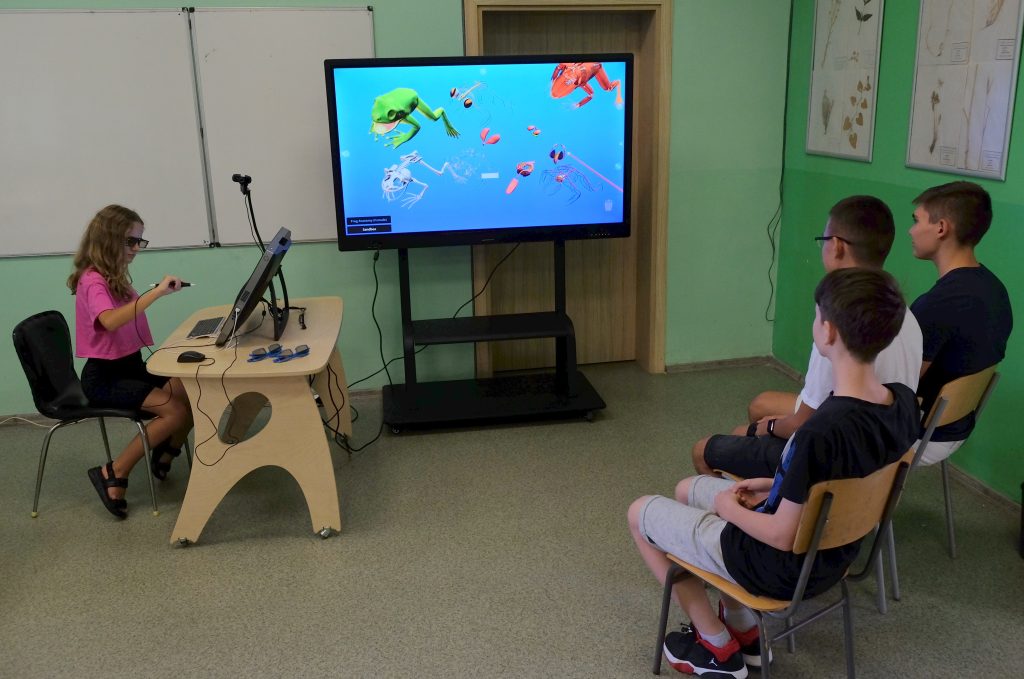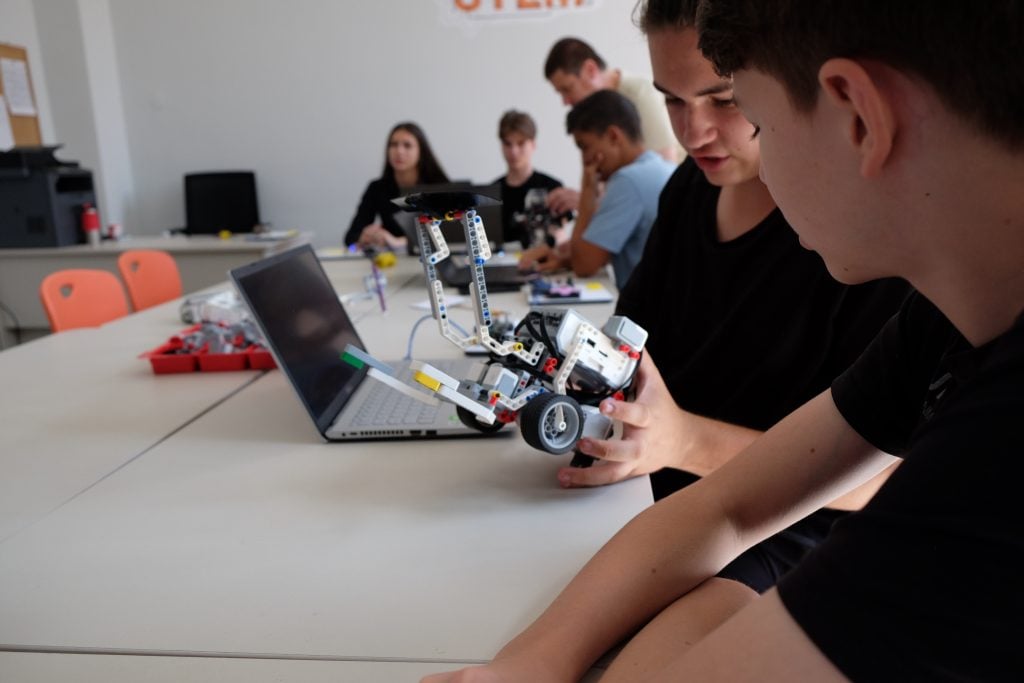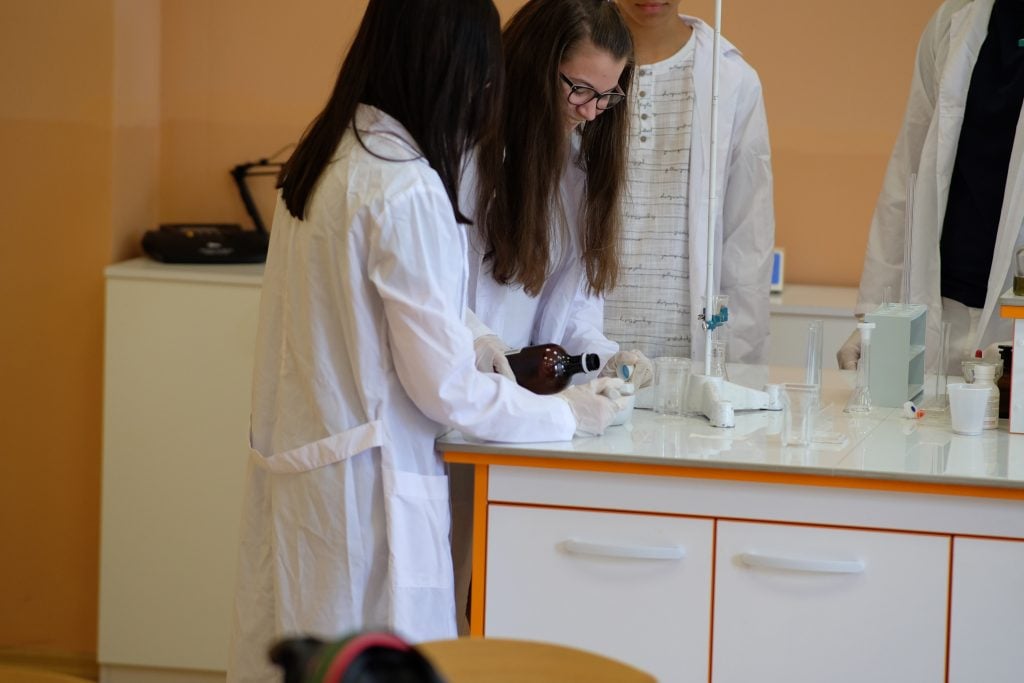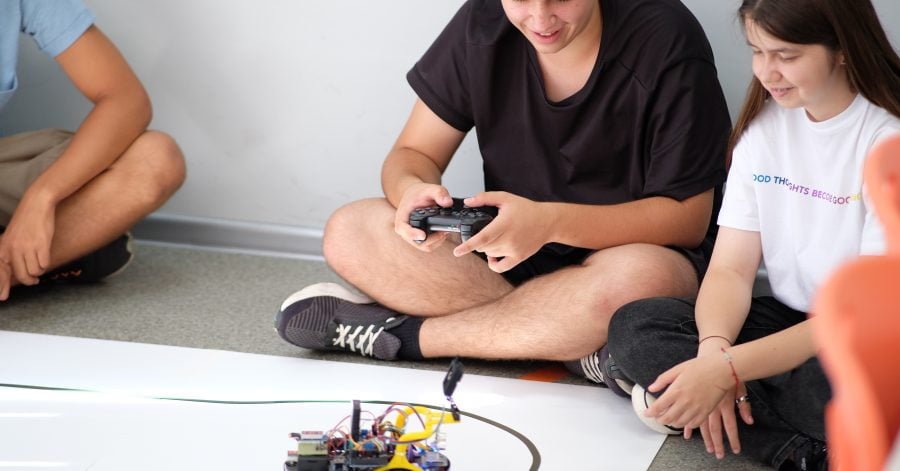Only have 1 minute? Here are 3 takeaways from the piece:
• Under the National Program ‘Building a School STEM Environment’, over 250 STEM centers have been established in Bulgarian schools. The goal is to have a STEM center in every state and municipal school by 2026, with a significant financial commitment of 270 M euro – backing this initiative. The emphasis is not just on infrastructure but also on training close to 40K teachers by 2027 in the competency-based model tailored for STEM environments.
• Prof. Petar Kenderov from the Institute of Mathematics and Informatics, BAS highlights a crucial concern regarding the national STEM initiative. He stresses the pressing need for proper funding for teacher training and the development of relevant educational materials. Without these components, the current investments in infrastructure might become obsolete before reaching their full potential.
• Building upon the concerns raised by Prof. Kenderov, Kostadin Nedev, the founder of Youth Inventor, identifies another pivotal challenge. He emphasizes the absence of a cohesive long-term national strategy that encourages collaboration between businesses, NGOs, and public schools. Nedev believes that this strategic alliance is crucial for cultivating and advancing future tech talents in Bulgaria.
The global emphasis on STEM (Science, Technology, Engineering, and Mathematics) education has grown exponentially in recent years. Countries worldwide are recognizing the importance of equipping their youth with the skills and knowledge required to navigate an increasingly digital and technology-driven world. Bulgaria, a nation with a rich history and a promising future in the tech sector, stands at a pivotal juncture. The question arises: Is Bulgaria making the necessary changes to foster a robust STEM education landscape?
The National STEM Center in Bulgaria
The National STEM Center, an educational institution in Bulgariahas been at the forefront of these changes. Under the National Program ‘Building a School STEM Environment‘, over 250 STEM centers have been established in Bulgarian schools. This initiative, piloted by the Ministry of Education, aims to lay the foundation for modern and high-quality STEM education. The subsequent project, ‘STEM Centers and Innovations in Education’, funded by the National Program for the Development of Education, envisions the establishment of STEM centers in every state and municipal school by 2026.
Currently, an impressive 2247 schools (out of a total of 2271) have submitted their concepts for the approval of equipment and the physical environment to the National STEM Center. Once approved, these schools will move forward with their project proposals, marking a significant stride toward achieving the goal set for 2026.
The financial commitment to this endeavor is substantial. The total value of the project stands at close to 270 million euros, with schools of varying sizes eligible for different financial resources. For instance, schools with up to 50 students can receive up to €25K , while larger institutions with over 1000 students can avail up to €300К.
However, infrastructure alone does not guarantee the success of STEM education. The teaching methodology and the competency of educators play a pivotal role. Recognizing this, the National Program ‘Modernization and Quality of Education’ aims to train 39К teachers by 2027 in the competency-based model tailored for STEM environments. The National STEM Center further bolsters this initiative by offering teachers access to equipment in their demo laboratory and providing free training resources, published in the e-library on the National STEM Center’s website.
Building on their commitment to enhancing STEM education, The National STEM Center has embarked on an ambitious international collaboration. As an accredited coordinator for student and staff mobility under the ‘Erasmus+’ program for the next five years, they are paving the way for students and teachers from ten Bulgarian schools to travel abroad and gain experience.
The aim is to establish connections with seasoned educational institutions across Europe that excel in STEM teaching. This initiative is not just a one-off; over the coming years, the consortium of schools under the National STEM Center’s coordination is set to grow. The vision is clear: as the school STEM environments are being established, parallel training processes are underway. By the culmination of this period, the aspiration is for every Bulgarian school to boast a fully operational STEM center, staffed by well-prepared teachers and attended by motivated students.
The growth trajectory of Bulgaria’s STEM education
Petar Kenderov, professor at the Institute of Mathematics and Informatics, Bulgarian Academy of Sciences, focused on General Topology (set-valued mappings) and Functional Analysis, offers a deep dive into the historical and current trajectory of Bulgaria’s STEM education. He emphasizes that Bulgaria’s strength in mathematics and related fields is not a recent phenomenon. The country’s journey began as early as 1949 with the organization of the first national Olympiad in mathematics. This foundation was further solidified with the participation in the first International Mathematics Olympiad, organized in Romania in 1959, and the establishment of ‘Schools for extracurricular work’ in mathematics across the country.
Prof. Kenderov believes that the involvement of professors from Sofia University and scientists from the Bulgarian Academy of Sciences in the preparation for international Olympiads has been a game-changer. Their participation elevated the scientific level of these activities, leading to the institutionalization of these efforts in 1976. The Unified Center for Mathematics was established, comprising mathematicians from both institutions, with a dedicated team for extracurricular work in mathematics.

Following the success of the international computer science competition in Sofia, Bulgaria took a pioneering step by proposing to UNESCO the establishment of the International Olympiad in Informatics (IOI) for school students. This initiative bore fruit in 1989 when Bulgaria hosted the inaugural edition of the IOI, witnessing participation from 13 countries. Today, the IOI stands as a testament to Bulgaria’s contribution to global informatics, with over 90 countries participating annually. The Olympiad has inspired countless students worldwide, with many of its past participants now leading the charge in the realm of Information and Communication Technologies. Moreover, the International Linguistic Olympiad, another brainchild of these efforts, was inaugurated in Borovets, Bulgaria, in 2003.
The support from the Union of Mathematicians in Bulgaria, coupled with the established traditions, infrastructure, and generous sponsorships from former competition participants and foundations, ensured the continuity of these initiatives, even during challenging times post-1989. Today, the nurturing of young talents in Bulgaria is widely recognized and supported by educational authorities and the mathematical and informatics community, reflecting Bulgaria’s sustained excellence in this domain.
As it comes to progress, Prof. Kenderov is quick to point out that while the material base of schools has seen significant improvement in the last couple of years, the essence of the educational process needs a paradigm shift. He acknowledges the impressive strides made in terms of infrastructure, educational content, and teachers’ pay. However, he stresses that the core challenge lies not in the framework but in the very nature of the educational process.
Prof. Kenderov critiques the traditional model where teachers disseminate information and students passively absorb it.
“We must realize that today’s young people from a very early age have absorbed other, multidirectional models of perceiving the surrounding world. From an early age, they listen to and watch television, use mobile devices, tablets, and computers, use Internet search engines to find facts, share what they see and hear with their peers, get a reaction from others, and this helps them orient themselves. In school, the emphasis should not be so much on individual facts (they are easily available on the Internet and/or in the textbooks!), but on the assessment of whether the presented thing is really a fact or false information, whether and how it is related to other established facts already known to the student. It is about cultivating critical and independent thinking, which is currently lacking and this is the main weakness of our education system”, Prof. Kenderov tells The Recursive.
He highlights that the sheer volume of new information necessitates a lifelong learning approach, where students are equipped with skills for self-directed and independent learning.
This approach, known as “Inquiry-Based Education” (IBL), mirrors the process of true scientific research. It not only fosters a deeper understanding but also produces informed citizens capable of navigating the political and socio-economic landscape. Prof. Kenderov laments that despite its proven benefits, IBL’s adoption in Bulgaria has been limited, primarily due to a lack of support from educational authorities and the absence of a new generation of teachers trained in this methodology.
Furthermore, he underscores the significance of the PISA study, an influential educational achievement assessment, as a guide for investors. Bulgaria’s performance in PISA, which ranks last in the European Union, is a stark reminder of the need for a shift in the educational approach.
Returning to the topic of the national program ‘Building a School STEM Environment’, Prof. Kenderov points out a significant shortcoming.
“The great weakness of this national program is that it does not provide adequate funds for the qualification and retraining of a sufficient number of teachers to work in these STEM centers. There are no provisions or sufficient funds to create appropriate learning content. This is expected to be the subject of another large-scale program. But until it is realized, years will pass and the equipment purchased today will become morally obsolete”, Prof. Kenderov explains.
Highlighting the potential role of the Bulgarian Academy of Sciences (BAS), Kenderov emphasizes its vast capabilities to enrich the STEM education process. With its advanced laboratories and seasoned scientists, BAS is well-positioned to support meaningful STEM activities. He notes that many BAS institutes are already proactive, collaborating directly with teachers and students to foster a vibrant STEM learning environment.
The Institute of Mathematics and Informatics of the BAS (IMI-BAS) has a long-standing tradition of supporting competitive mathematics, with national teams receiving their training at the institute. The School Students’ Institute of Mathematics and Informatics (SSIMI) at IMI-BAS provides students an opportunity to showcase their independent research projects in mathematics and informatics, with some projects achieving the distinction of being published in scientific journals.
One notable initiative by IMI-BAS is the “Virtual School Math Lab” (VirMathLab), developed over the past decade. This platform, accessible at www.cabinet.bg offers over 1,500 applets, enabling students to visualize and experiment with mathematical concepts.
Additionally, VirMathLab features the online competition “VIVA Mathematics with Computer,” which encourages the integration of modern software systems such as GeoGebra in school education. IMI-BAS is also actively participating in European projects focused on Inquiry-Based Education (IBE), ensuring that the Bulgarian educational system is in sync with international STEM education trends.
The private sector’s role in STEM education
Kostadin Nedev, a Senior Air Force Pilot and the founder of the Youth Inventor platform, represents a beacon of hope in the private sector’s involvement in STEM education. His innovative educational platform aims to prepare children for the job roles of tomorrow and embodies the principles of IBL, emphasizing hands-on learning and real-world application. To accomplish this, they’ve crafted their own hardware kit, user-friendly software that can be easily programmed by even a complete novice, and an educational approach inspired by the training methods used for fighter pilots. What’s more the platform puts a strong emphasis on using robotics and AI for a sustainable future.

The platform’s first batches of students have already graduated as inventors. Young Inventor was named the “Best education startup for 2022” and received the presidential award “John Atanasoff” for a “Project with high social impact”. Furthermore, the platform has fostered strategic partnerships, notably with the British software company Amdaris, to innovate the educational ecosystem in Bulgaria.
Drawing parallels between aviation training and the process of invention, Nedev emphasizes the importance of mindset. Just as pilots must understand that they control the aircraft, inventors must believe in their ability to create.
“Once you have this mentality that, hey I am the pilot, life in the air becomes much easier. But it doesn’t happen overnight. Changing a kid’s consumer mindset is the same. The more they learn, the more they believe that they can create their own things, and the more they dream and it is absolutely fascinating for the teachers to be part of this change in kid’s behavior. Of course, there is a lot of science and knowledge behind this transformation. Our team of psychologists has developed a unique methodology on how to measure and track this behavior. At the end of the program, everyone has particular skills and knowledge, but the learning path is different”, Nedev explains for The Recursive.
Challenges and opportunities
While the initiatives and efforts from both the public and private sectors are commendable, the journey to a robust STEM education in Bulgaria is not without its challenges. Kostadin Nedev, with his hands-on experience in the field, pinpoints a significant gap in the STEM education landscape: the lack of a long-term national strategy that fosters collaboration between businesses, NGOs, and public schools. Such a strategy is essential for nurturing and developing future tech talents. Youth Inventor has already initiated a program to train young STEM educators, with some of the best graduates from the class of 2023 joining their ranks.
Moreover, Nedev’s concern about the scarcity of tech educators resonates with the broader challenge faced by many countries. The best tech talents often gravitate towards lucrative opportunities in the industry, leaving a void in the educational sector. Addressing this requires a concerted effort from the community to encourage and incentivize these talents to share their knowledge with the younger generation. Youth Inventor’s initiative to recruit top graduate students as future STEM educators is a step in the right direction.
However, the challenges also present opportunities. The rapid development of robotics and artificial intelligence offers Bulgaria a chance to leapfrog and position itself as a leader in these domains. But this requires a shift in perspective. As Nedev aptly points out, the focus shouldn’t just be on catching up with leading technological nations but on leveraging these technologies for sustainable living. The key lies in integrating sustainability into the STEM education framework, ensuring that the next generation of inventors and innovators prioritize sustainable solutions.
“We cannot be a leading technological nation without a huge investment in tech education at the national level. The business can make a significant impact as well but it needs to do more. Our partnership with Amdaris is a great example of that. I believe that Bulgaria has the potential to be a leader in a lot of tech sectors. Investing in a strong startup ecosystem is also super important”, Nedev says.
Youth Inventor is currently in its growth phase. Their latest expansion includes the cities of Varna, Burgas, Ruse, and Kyustendil. In September, the platform launched a nationwide campaign to promote STEM education, conducting demo lessons in cities like Stara Zagora, Smolyan, Plovdiv, Varna, and Sofia.

“My personal wish for the near future is to make our technology and education available for every kid in Bulgaria, wherever they live or whatever social status they have”, Nedev concludes.
Decoding the future: Bulgaria’s STEM outlook
Bulgaria stands at a crossroads. The country has a rich legacy in mathematics and related fields, and the current efforts in STEM education are promising. However, the road ahead demands more than just infrastructural upgrades and curriculum changes. It requires a paradigm shift in teaching methodologies, greater collaboration between various stakeholders, and an emphasis on sustainability.
As Steve Jobs once said, “Everything around you that you call life was made up by people that were no smarter than you. And you can change it. You can influence it.” With this spirit, Bulgaria can not only transform its STEM education landscape but also position itself as a global leader in technology and innovation.








